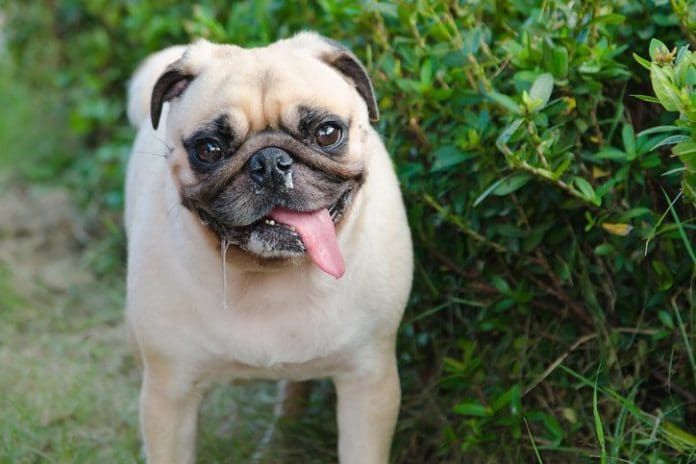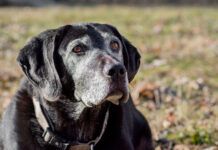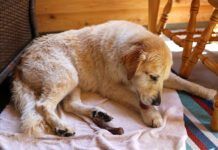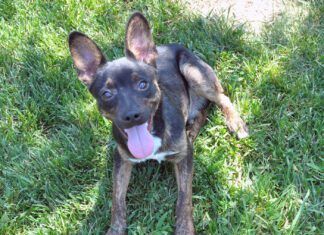It’s that time of year again. Runny noses and sneezes abound for us humans, as new plants bloom in the fall. But did you know that your dog can have a runny nose too? Dog runny noses are more correctly called nasal discharge. It can run the gamut from clear and watery to thick and purulent. The appearance and frequency of nasal discharge in dogs can tell you much about the underlying cause.
Could My Dog Have Allergies? In Short, Yes.
A thin, watery discharge without color or odor is likely a sign of mild irritation in the nasal cavities. This can occur with seasonal allergies or other causes of inflammation within the nose such as an inhaled foreign object (grass and seeds). In some cases, antihistamines will clear up the discharge without further incident. Dogs do sometimes respond to environmental allergens just as humans do—with red, watery eyes, sneezing, and a runny nose.
More Serious Causes of Dog Runny Noses
In cases where the discharge is thick, has odor, or discoloration with blood or pus, more serious causes are suspected. If this is the case, your veterinarian will do a thorough investigation of your dog’s recent history (any history of kennel boarding, grooming, dog park visits, or doggy daycare? Any exposure to dogs otherwise?) and a physical exam. They will also review your dog’s vaccination status to make sure that they are current.
Once the initial history and exam are finished, your veterinarian will discuss possible causes of your dog’s runny nose. If both nostrils are involved, the causes are frequently different than if only one nostril. Both nostrils points to a more generalized cause while one nostril points to a localized source. If the discharge is clear, thin, and watery, your veterinarian may try antihistamines and monitoring at home for any other signs. If none develop, and your dog seems otherwise healthy, it may be normal for a small amount of discharge to occur. No further treatment may be needed.
If the discharge continues or worsens, then more diagnostics are needed. In the case of unilateral discharge (one nostril involved), the causes could include an inhaled foreign body such as grass or grass awns leading to rhinitis, a fungal infection, or a nasal tumor. Your veterinarian will likely try a course of antibiotics. If no response occurs, then the next step is generally a rhinoscopy. In this procedure, your dog will be anesthetized, a camera will be inserted into the nostril to look at the area, and samples will be taken for culture and biopsy. In some cases, a CT scan of the head is needed to make a definitive diagnosis.
If both nostrils are involved, this points to a more generalized problem such as a viral or bacterial infection. Dogs are prone to both especially if they board at a kennel, visit the dog park, or go to grooming facilities.
Canine influenza is becoming more common in the dog population. In this case, concurrent with the runny nose would be a fever, sneezing and coughing, lethargy, and often lack of appetite. Pneumonia is a possible side effect. Canine kennel cough, a common bacterial complex, can also cause a nasal discharge. This generally occurs when the disease progresses to pneumonia.
Summary
In the case of a dog with no other symptoms and some clear nasal discharge, a runny nose is not cause for immediate concern. It is when your pet develops other symptoms such as red, watery eyes, sneezing, coughing, fever, lack of appetite, or lethargy that a trip to the veterinarian is warranted.
Looking for more? Check out this page on runny noses in dogs.







Hello,
Thank you for the article. My female lab has chronic nasal discharge (rhinitis) to both nostrils. Discharge started mild and as she got older, the discharge got thick green and accompanied with sneezing and lethargy. Rhinoscopy found no polyps or foreign objects. Culture found Pasteralla so antibiotics with a steroid was provided. This cleared up discharge for awhile, her energy returned but as time went on it comes back. After taking allergy meds, apoquel and regiment of other meds nothing helped. Now she has an inhaler (flovent HFA 100mcg) and takes Azithromycin (250mg) every other day but still has thick yellow discharge but not as much or green and reverted sneezes alot. Ive spent thousands over the years and seem to get nowhere. Any other ideas?
Ditto. On antibiotics for 3 months. Improvement when warmer weather.
Colder weather back to sneezes and streams of mucus tho clear to transluscent.
My allergies are horrible in the winter when the furnace goes on. I take Zyrtec.
Wonder if dogs can take it or something similar:
I googled and they can have Zyrtec and claratin small dogs get five ml Of claratin and dogs 50 lbs get ten over can have two hope this helps
I’m not clear on how much you said was okay for my 115lb German Shepherd. Could you please say that another way? Thanks
Please keep me updated as I am going through the EXACT same thing with my lil guy, and no lasting results:(
shestunts@outlook.com
Could be a dental infection or an ornasal fiscual
Oh
I’m going through something similar. My little 10lb dog noticed her right nostril was inflamed and has clear discharge. Went to a specialist for rhinoscopy instead he prescribed antibiotics. I want to get her teeth cleaned and was referred to a veterinary dental specialist…they can see with dental X-ray and or ct scan if she has something serious.
Hello,
My dog has a runny nose on both nostrils. Although her nasal discharge is mild and thin, her body is cold. Is there any danger to that? How should I help her?
Just wondering if any of the questions folks post here ever get answers?
probably not due to liability and people’s inclination toward litigation .
My dog had a thick muddy mucous then lead to bloody nose. Started with one nostril and ended up bleeding with other nostril. Vet prescribed antibiotics and steroids but still did not clear up. Two sets of antibiotics prescribed still did not cure. Unfortunately my dog just past 3 days ago. He threw a seizure 1 week ago and died 4 days after the seizure. He was 12 years old and had arthritis. So sad.
Mary Ann, that’s heartbreaking. I’m so sorry you lost your sweet boy. It’s very hard to say goodbye, but I truly believe we’ll see our best buddies again someday. I’ve been through it several times in my life already, and what always helps me is saving another life in their honor, and giving a new dog all the love they deserve. He’ll always be in your heart…until you meet again. God bless you always.
My dog had the same thing a few years back. A bloody nose turned into Grand Mal seizures. It was horrible. He passed a few weeks later. So sorry for your loss.
Nasal mites can cause sneezing and discharge. They are a possibility that can be overlooked as vets seem to think they aren’t common.
My rescue large lab/shepherd mix has had nasal discharge from the beginning. It is thick and not clear. Whenever he sneezes out it comes! I constantly have tissues with me and it’s like wiping the nose of a toddler. He has been on antibiotics (no help) and he gets allergy shots now – we’ll see if those help as time goes on. It’s very frustrating for sure. Also I’m sure this contributes to his breath smelling!
Could be his teeth and infection
My dog has the same thing. Didn’t develop until a week after adoption. Going on 6 days now. Did the meds work?
My dog had his K9 teeth left top removed due to cavity. 6 months after his dental procedure and with the pollen his left side of his nose has a discharge that went from clear to thick mucus. He had the allergies injection but he still has discharged and ear infections so
My collie was diagnosed with nasal lymphoma. This article brought back a lot of bad memories of what he had to go through. Don’t waste anytime getting your dog checked.
This is for Mary Ann, I just saw your post. I don’t understand why no one replies to our posts when they tell you to ask a question. I am not a vet but I have been a vet tech and have worked with dogs for a long time. The muddy mucus discharge may be was an indication of old blood with the mucus it gave it a brownish color. Your baby may have had a tumor in the lungs which would cause nose bleeding or a brain tumor or something in the sinus cavity. Three weeks ago I was grooming a Shih Tzu that started sneezing and the nosebleed was terrible. It ended up being a tumor in the lungs. I am so sorry for your family member you’re little joy that you lost. I am disappointed that whole dog journal didn’t give you any kind of response. Dog journal should have at least told you to follow up or get a second opinion. Other than that it’s a great little magazine I loved getting it. God bless and stay well
I have a brand new shitzu I got last night m he has a terrribly running nose he sneezes n it just flies out he didn’t sleep hardly at all poor thing the lady I got him from says one nostril is bigger than the other I can’t tell that I said he’s got a runny nose n she covered n said that I paid 800 dollars for him I hope he’s not sick
Thank -you, Dana, for responding to me. I just saw your response as I was thinking about my dog and still wondered what was the cause of death. A year later I miss my best friend. A lot. He was such a great dog. It was so nice to see your response. He did have the inverted sneeze too. I have a 4 month old puppy now same breed and I accidentally call him Ivan every once in awhile. Thank -you for caring and God Bless you too!
My 8 year-old 50lb mix also has had chronic yellow-mucus for the past 6 months. First, vet prescribed antibiotics. Then, nasal scope to remove any foxtails and more antibiotics. Then “deeper” nasal scoping surgery and more antibiotics and steriods. It is now suggested that the cause may be a fungal infection.
How is fungal infection diagnosed?
I see posts that suggest dental infection may be the cause and he may have a bad tooth in front. Has anyone had a bad tooth removed and then constant mucus cleared up?
I’ve been going through this with my husky since February 2019. Started with coughing for about a month before any nasal discharge developed. Ct scan, rhinoscopy, no results. Lung xrays and blood work every couple months, antibiotics here, antibiotics there. Randomly started having focal seizures, put him on gabapentin which helped stop that. Had a bad tooth so we got it removed in March 2020. No improvement. Tried antihistamines, no luck. Apoquel did nothing. Developed a rash on his face, looks like zrd so we start him on zinc. Rash gets infected after being scratched at, tried treating with an ointment and antiseptic wipes for a couple weeks. No improvement so we started clindamycin three days ago. Yesterday his nasal discharge was bloody, still bloody this morning. This was one of the healthiest dogs I’ve ever had up until this started. Very frustrating spending thousands and getting no answers. Rhinitis is the only diagnosis I’ve gotten but that doesn’t account for any of these other symptoms.
I ended up going to a specialist and he recommended getting an MRI, but of course those are super expensive and I was told it would be about $850. There is a pretty exciting treatment for fungal infections using Vagisil and a scope. I would think if nothing else can be diagnosed then that definitely could be an option, but again it is super expensive and if the dog doesn’t have a fungal infection then you just spend a lot of money for no reason. I think my dogs are going through this, but it is allergies. It really sucks when vets can’t tell you what is going on.
My dogs are coughing and instead of discharge coming out. He like a little kid. He sucks them back up. Then that’s when he starts to cough. I thick he coking on mucus! But over all its allergys! Just push fluids and allergy pills.
Where was this specialist located please
My dog had unilateral discharge that started out runny. That was about 6mos ago. His discharge is now thick and occasionally comes out of the other nostril. I suspect that there is something that may be stuck in his tonsil or nostril but the vet says that he cannot be sedated for an exploratory rhinoscopy because he has kidney disease. I have spent over ~$3k so far with may blood tests, x-rays, cultures, etc., to no avail. Not sure what to try next. Very frustrating! :/
I have been going through the same thing with my old boy.Perfectly healthy 11yrs until six months ago.Thick green snot,nose bleeds,etc.We had rhinoplasty but nothing showed up.Had antibiotics and steroids.I`m now giving him antihistamines and Metacam but it doesn`t seem to be working so I keep washing the bedding and cleaning him up when needs be.So frustrating.
I have a 6 month old female pup of a larger breed.
Usually really exuberant but the last couple days not so much.
She has a runny nose which is clear.
I’m not sure what to give her.
Is it ok to give quafenaseine( spelled wrong) and a cough Med?
Our Shih Tzu started having a lot of reverse sneezing and a runny nose. We kept taking her to the vet and he just kept saying it was reverse sneezing and put her on meds for reverse sneezing. However, I had the feeling it was more serious, so we switched vets and the new vet said the same thing with a possible nasal tumor, and if she her bleeding and didn’t get better in one week to bring her back in for a recheck. Then our dog got progressively worse in less than one week to the point of losing her balance on walking sideways. When we took her to an advanced animal hospital in Nashville, Tennessee, she had no control of her back, legs, etc. She was diagnosed with nasal surgery that went to her brain. Long story short, excessive, prolonged nasal discharge even if clear is not normal. Don’t waste your money and time with a general vet, seek advanced treatment, as some tumors can be shrunk with radiation if you get your dog to the right vet in time. We had to put our sweet 2-year-old dog down because she started having convulsions and crying out in pain. My concern is that she suffered a long time because of an incorrect diagnosis time after time and $$$$$ dollars later. After doing a lot of reading on my own about signs of nasal tumors/cancer, the vets should have diagnosed my dog much sooner.